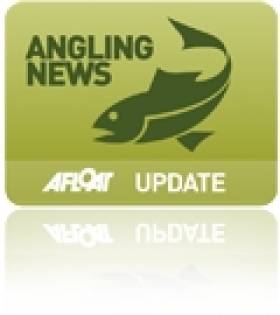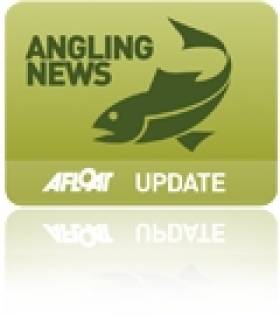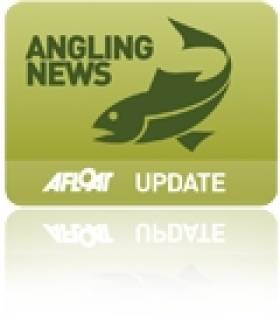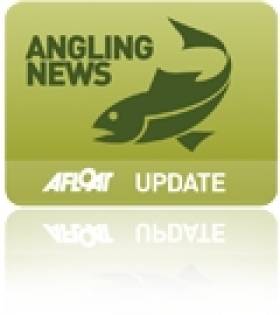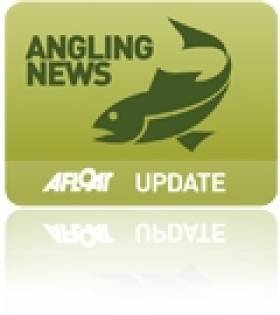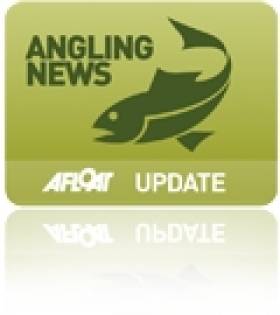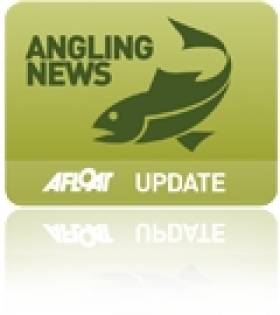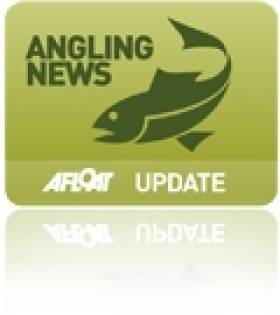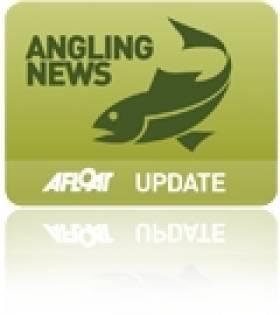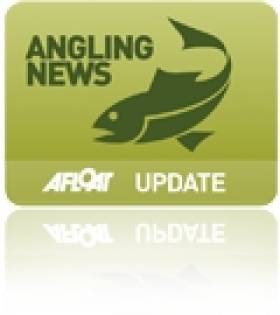Displaying items by tag: angling
#Angling - Inland Fisheries Ireland (IFI) recently welcomed a visit from Dr Jed Wright of the US Fish and Wildlife Service, who is an expert in habitat assessment, protection and restoration programmes for Atlantic salmon in the Gulf of Maine.
During this visit, Dr Wright spent a day viewing weirs on the Rivers Nore and Slaney and was impressed by the "innovative" fish passage techniques used to support fish migration efforts over a number of these structures.
Following this, Dr Wright gave two informal talks dealing with riverine habitat restoration and barriers assessment in Maine.
Dr Cathal Gallagher, head of research and development with Inland Fisheries Ireland, said IFI "welcomed this important opportunity to share expertise in riverine and habitat restoration techniques.
"It is important that Ireland shares expertise in dealing with complex and difficult issues associated with restoration of damaged rivers and habitat. This is of particular importance when addressing Ireland’s commitments under the Water Framework Directive.”
#inland – The Clodha Wheelyboat, a wheelchair accessible flat deck boat, was today launched by Minister of State for Natural Resources, Joe McHugh TD, at Rooskey Lough, Co Donegal.
The Clodha is the first boat of its kind in the Northwest and has been funded by Inland Fisheries Ireland (IFI) and Rural Recreation Funds. It is operated by the Creeslough and District Anglers and was sourced from the Wheelyboat Trust, a registered charity in England. The boat provides wheelchair users with hassle-free and independent 'roll-on, roll off' access on board via an external ramp and a hydraulic platform. The deck is open and level throughout, and wheelchair using anglers can sit at the bow, the stern or the helm of the boat.
Speaking at the launch, Minister McHugh said: "The Clodha Wheelyboat is a wonderful addition to the angling infrastructure in Donegal. This area has some of the most beautiful angling in Ireland and is today becoming even more accessible by providing disabled people with the opportunity and freedom to enjoy angling here.
"I encourage anglers of all abilities to come to Rooskey Lough to try this boat and, of course, the fishing. I congratulate the Creeslough and District Angling Club who have worked on this ambitious initiative which will support economic development and jobs here in Donegal.'
The Creeslough and District Anglers have been at the forefront of developing angling tourism in Donegal through the provision and organisation of angling to locals and tourists alike. This development project has seen the resurfacing of the access road leading to Rooskey Lough; the provision of a boat shed; the installation of disabled chemical toilets; provision of an ESB connection; and disabled angler access along with the new specialist angling boat.
The club is a member of the Donegal Angling Tourism Alliance and has been instrumental in progressing the marketing of Donegal in a strategic alliance with IFI and the recent Donegal Angling Holidays project through EU-funded rural development programme 'LEADER'. The programme supports activities that improve quality of life in rural areas and which help diversify the rural economy.
#Angling - Many of the world's top anglers will be at the Craigavon Lakes this weekend for the 13th World Championships in predator bank fishing with lures.
And as the Lurgan Mail reports, Team Ireland will be fielding a local in Lurgan man Chris Laverty against stiff competition from as far afield as Russia on 23-24 May.
Pike, perch and stocked rainbow trout will be the anglers' quarry in two four-hour blocks on Saturday and Sunday – but they won't be taking any home as it's strictly a catch-and-release contest using barbless hooks.
The Lurgan Mail has more on the story HERE.
IFI Invites Submissions On Eel Stock Management
#Eels - Inland Fisheries Ireland (IFI) invite submissions from interested parties on the following reports:
- Report on the Implementation of Eel Management Plans for Ireland, including the transboundary NWIRBD 2015
- Report from the independent Standing Scientific Committee on Eel 2015
- Report on IFI’s National Eel Monitoring Programme 2012-2014
These reports should be read in conjunction with the original report:
- National Report for Ireland on Eel Stock Recovery Plan - Including River Basin District Eel Management Plans
All the above documents are available for download from the Inland Fisheries Ireland website HERE or on CD-ROM from the address below.
These reports include the latest research and management information on eels in Ireland compiled over the last three years and updates the status of the stocks.
The management policy for eels in Ireland over the next three years will be determined from these reports and any relevant submissions received from interested parties.
Any party wishing to make a comment should send their submission on or before Wednesday 17 June 2015 to [email protected] or by post to:
Eel Submission, Inland Fisheries Ireland, 3044 Lake Drive, Citywest Business Campus, Dublin 24
'Difficulties' For Disabled Anglers In Co Antrim
#Angling - Are developers causing difficulties for disabled anglers in Co Antrim?
That's what the Six Mike Water Trust's Michael Martin has alleged, as Farming Life reports, with claims that housing developments on the Kirbys’ Lane river walk are "destroying the river corridor" at the disabled angling stand.
What's more, a proposed development for 400 homes on the Six Mile Water's flood plain downstream in an area home to a variety of aquatic wildlife is "surely... a contravention to EEC Water Framework and Habitats Directives."
Farming Life has more on the story HERE.
#faw – A programme of activities to mark Fisheries Awareness Week 2015, the annual event run by Inland Fisheries Ireland (IFI) was launched today, with a range of fisheries-related public events in angling hotspots around the country from Friday 15th to Sunday, 24th May.
Fisheries Awareness Week runs nationwide each year in early summer, and aims to encourage adults and children to take up fishing as a new hobby. To achieve this, IFI works with angling clubs and organisations to promote all types of angling – from trout spinning to fly fishing.
IFI also uses this platform to promote its role in protecting and conserving our fisheries resource. IFI works with existing anglers to heighten their awareness of the environment with events ranging from game, coarse and sea angling demonstrations, river walks, open days at fishery facilities and more.
Commenting on Fisheries Awareness Week, Dr Ciaran Byrne, CEO of Inland Fisheries Ireland, said: "This annual series of public angling events has proven highly popular and every year hundreds of people turn out to join angling clubs for introductions to shore angling, fly casting and more. We are particularly delighted that every year, adults and children who have never fished before attend these events and discover their passion for what is a great hobby.
"Ireland offers a wealth of rivers and lakes as well as fantastic stocks of high-quality fish. The importance of protecting and conserving our fisheries resource in Ireland cannot be understated – it contributes to our health and wellbeing, our environment and our economy. Fisheries Awareness Week is a fantastic way of raising awareness nationwide."
A number of events will take place from Cork to Donegal, including activities such as an exploration of the sea shore with a marine biologist in Waterville; an introduction to fly fishing and spinning for trout in Balrothery; and introductions to fly fishing in Carrigavantry, Co. Waterford and Meadows Trout Fishery in Fanad, Co Donegal. Events are free and open to all.
For the full programme of events for Fisheries Awareness Week 2015 visit here
Lough Neagh Eels Star Of The Show At NI Angling Fair
#Angling - Derry chef Emmett McCourt looks forward to giving visitors to the Northern Ireland Angling Show a taste of Lough Neagh's world-renowned eels this coming June.
As the top cook tells the Londonderry Sentinel: “Lough Neagh eels are revered around the world as the best there are - but people here [in Ireland] don’t generally eat them.”
McCourt wants to make them the star of the show at the angling expo, which was first held last summer alongside the popular Irish Game Fair on the shores of Ireland's biggest lake.
The joint events are expected to highlight the wealth of local produce and artisan food, not to mention recipes reflecting the traditions of the region.
The 2015 Irish Game Fair and Northern Ireland Angling Show take place over the weekend on 27 and 28 June at Shane’s Castle in Antrim.
IFI Reviews Pike Management In Wild Trout Fisheries
#Angling - Inland Fisheries Ireland (IFI) says it has "temporarily suspended" pike management operations in designated wild brown trout fisheries.
The agency added that it is "currently undertaking a review of the necessary standard operating procedures for these operations and will resume stock management as these are completed."
This review, according to IFI, will focus first on boat electrofishing (using electricity to stun fish in the water before catching) before other stock management methods.
Minister Launches €240K Funding For Fisheries Development
#Angling - The 2015 Salmon Conservation Fund (SCF) and Midland Fisheries Fund (MFF) are now open for applications, Minister Joe McHugh has announced yesterday (Wednesday 15 April).
In total, €240,000 is available to conserve and develop the inland fisheries resource from funds generated through the sale of salmon licences and Midland Fisheries Area permits.
The schemes administered by Inland Fisheries Ireland (IF) will facilitate clubs, fishery owners, commercial salmon fishers and other organisations to undertake works to improve habitat, stocks, access, invasive species management and angling, under the supervision and direction of IFI.
The works undertaken are important in maintaining and improving capacity within the inland fisheries resource, which is estimated to contribute €755 million annually to the Irish economy.
Announcing the schemes, Minister McHugh said: “I am pleased to be able to support IFI in making these funds available to fisheries interests to allow for ground-up, managed sustainable development of the inland fisheries resources.
"Some wonderful projects have been supported since these funds have been established and I encourage all those interested in fisheries to investigate the possibilities under the various schemes to conserve, develop and promote their local fisheries.”
The Salmon Conservation Scheme has been in existence for eight years and has allocated funding to 184 salmon projects all around Ireland. €200,000 is available for distribution under this scheme in 2015.
The Midland Fisheries Fund, which is now beginning its third year, has seen 17 projects undertaken in the midlands area developing angling resources, supporting scientific research and conserving fisheries habitat. A further €40,000 is available under this scheme for 2015.
Full details and application forms are available on the Midland Fisheries Fund HERE.
Cork Angling Documentary Makes The Film Festival Rounds
#Angling - A short documentary on top fly-fishing name Glenda Powell is garnering plaudits at film festivals around the world.
And as Ellie O'Byrne writes in the Irish Examiner, the film sprang out of an article on the world-champion fly-caster for that very newspaper by ecologist Carl Dixon.
Unwinding is a five-minute short that illustrates Powell's love of angling on the River Blackwater and the nature that surrounds her as she casts her flies.
Inspired by Powell's story after an assignment for the Examiner in 2011, Dixon explains how he completed a filmmaking course to learn the ropes before taking up the camera for the €800 micro-budget film.
And it seems his dedication has paid off, with film festivals as far afield as Washington and California including the short in their selections.
The Irish Examiner has more on the story HERE.


























